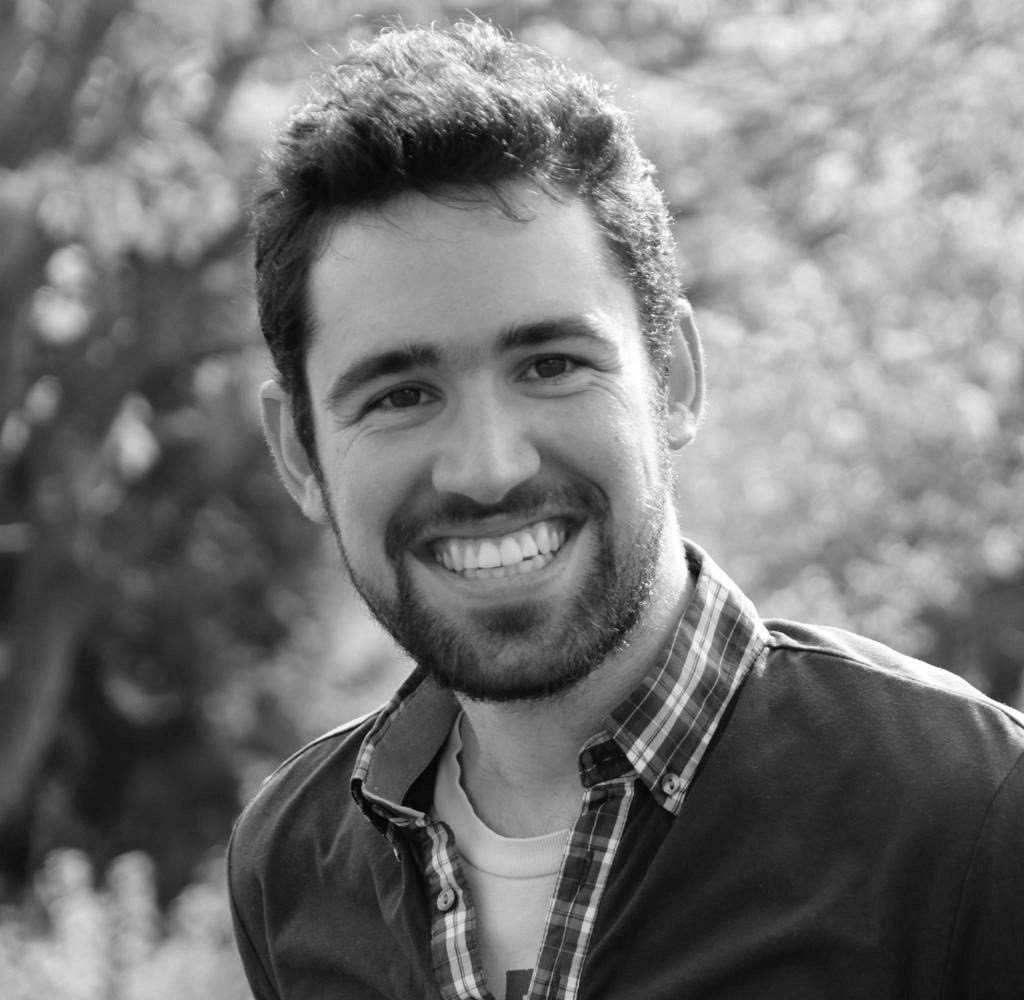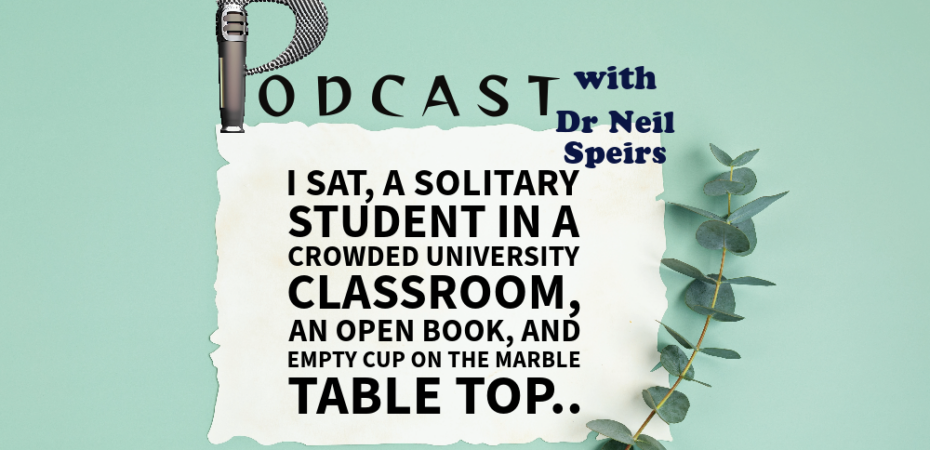
In this episode, Dr Neil Speirs narrates real life stories depicting the challenging lived experiences of working class students at the University. He is a Widening Participation manager, practitioner and researcher at The University of Edinburgh. This podcast accompanies the July-August Learning & Teaching enhancement theme: Learning and Teaching Conference 2023↗️.
I sat a solitary student in a crowded university classroom, an open book, and empty cup on the marble table top
In this podcast we hear about the often-challenging lived experience of working-class students – how they can, as Diane Reay writes, be made to feel ‘bruised and battered by the whole experience’. The podcast narrative is delivered through a storytelling format, to replicate the way that our students first shared their experiences.
This podcast episode is narrated by Neil himself. He takes us on a journey that begins in the morning as various students from working-class backgrounds are getting ready to go to the University and ends when the same students are heading back home to various personal responsibilities. The narration touches every listener’s heart shining light on the harsh realities and social stigma that students can experience day to day at the University.
Chapter 1: Getting there
“It’s not as easy as 123. I need to make breakfast for my Gran and make sure she’s OK… My child wasn’t feeling so well this morning. I left as early as I could, but it still caught me out. Sometimes life just rises and falls around me. Whereas for some, they arise refreshed from sleep and fall into their own suite bathroom and make the short walk fully breakfasted to the campus. I know it’s not very easy for a university like Edinburgh to understand a student like me”.
Chapter 2: Class
” Social class matters on campus! See, I’m not scared that others would say something to me about it. It’s just that I don’t want to be there, you know, so there’s a chance of them saying something to me, something ignorant, something like that. I’m just kind of on the side lines. Just watching from the outside, I know social class matters on campus. I see the divide every day”.
“You don’t sound right. You don’t look right. It’s the same with age. I’ve definitely been treated differently because of that”.
“Individuals with more privileged backgrounds will often have already covered the content. And they’re finding it really easy, and then they’ll turn around to people like me and be like, ohh, don’t you know this? I think you should know this. How come you don’t know this? “.
Chapter 3: Solidarity
“On this particular afternoon, I was reminded of how Diane Reay writes about how Bourdieu views “the dispositions which make up habitus as the products of opportunities and constraints framing the individual’s earlier life experience”.
As a result, the most improbable practices are rejected as unthinkable. I can hear our student voices and see the improbable and the unthinkable. Our work in widening participation involves changing what is seen as the improbable and unthinkable………..our work is filled with a Freirean sense of love, of hope, and of solidarity.
“Let me tell you about the staff member I know that buys a food shopping every month for one of their tutees, or the staff member that provides extra tutorial support for an hour every week over teams for a couple of students. The staff member that gives a new copy of one of the recommended texts to some of their students every single year”.
Chapter 4: Home time
‘I’m hoping the bus won’t be late or the traffic slow me down. I’ve gotta get home and then back out straight away for my evening shift of work. I need to make my gran her dinner and get her ready for bed. I’ve got to collect my daughter from after school and then get dinner”.
Neil concludes this episode with a message from a letter that Albert Camus wrote to his teacher after winning the Nobel Prize for Literature
“My first thought after my mother was of you. Without you, without the affectionate hand you extended to the small, poor child that I was, without you teaching an example, none of this would have happened. I don’t make too much of this sort of honour. But at least, it gives me the opportunity to tell you what you have been and still are for me. And to assure you of the efforts, your work and the generous heart you put into still lives on in one of your little school boys who, despite the years, has never stopped being your grateful pupil. I embrace you with all my heart”.
There are many staff that support students with great acts of kindness – filled with Freire’s pedagogy of hope. What we do with and for our students is valued and remembered by them – we hope that this realisation can remind us, as staff, of the value of what we do and why we do it.
Time stamps:
(1:06) Chapter 1: Getting there
(2:19) Chapter 2: Class
(19:00) Chapter 3: Solidarity
(21:49) Chapter 4: Home time
(22:26): Concluding remarks by Neil Speirs – a reminder to staff about the value of what we do and why we do it
Neil Speirs
Dr Speirs’ role involves working as a manager, practitioner and researcher in a number of areas concerning widening participation & access and related policy. He has strategic oversight and management of a number of self-generated community projects. These projects along with his teaching and research are centred around a number of areas of interest that span from primary education through secondary, further and higher education. A few of these areas of interest and specialisms are; the transition from primary to secondary education, the academic achievement of working class young males, the sociology of sport, widening participation student transitions, the equity of student experience, social reproduction & critical pedagogy, the working class mature student, the hidden curriculum, peer-related pedagogies and autoethnography.
 Gabriele Negro
Gabriele Negro
Gabriele’s role in the Widening Participation team includes coordinating two mentoring schemes for students from WP backgrounds, and he is particularly interested in the WP student experience at the University. While some of his work is focused on current students, Gabriele also supports outreach projects in local schools, such as delivering workshops in Primary schools and raising aspirations about science in Secondary schools as part of a partnership project between HE institutions in Edinburgh.
Episode produced and edited by:
 Sylvia Joshua Western
Sylvia Joshua Western
Sylvia is currently doing her PhD in Clinical Education at The University of Edinburgh and has a Master’s degree in Clinical Education. Her PhD research explores test-wise behaviours in Objective Structured Clinical Examination (OSCE) context. Coming from a dental background, she enjoys learning about and researching clinical assessments. She works part-time as a PhD intern at Teaching Matters, the University’s largest blog and podcast platform through Employ.ed scheme at the Institute of Academic Development.
 Joséphine Foucher
Joséphine Foucher
Joséphine is doing a PhD in Sociology at The University of Edinburgh. Her research looks at the intersection between art and politics in contemporary Cuba. She supports Jenny Scoles as the Teaching Matters Co-Editor and Student Engagement Officer through the PhD Intern scheme at the Institute for Academic Development.


